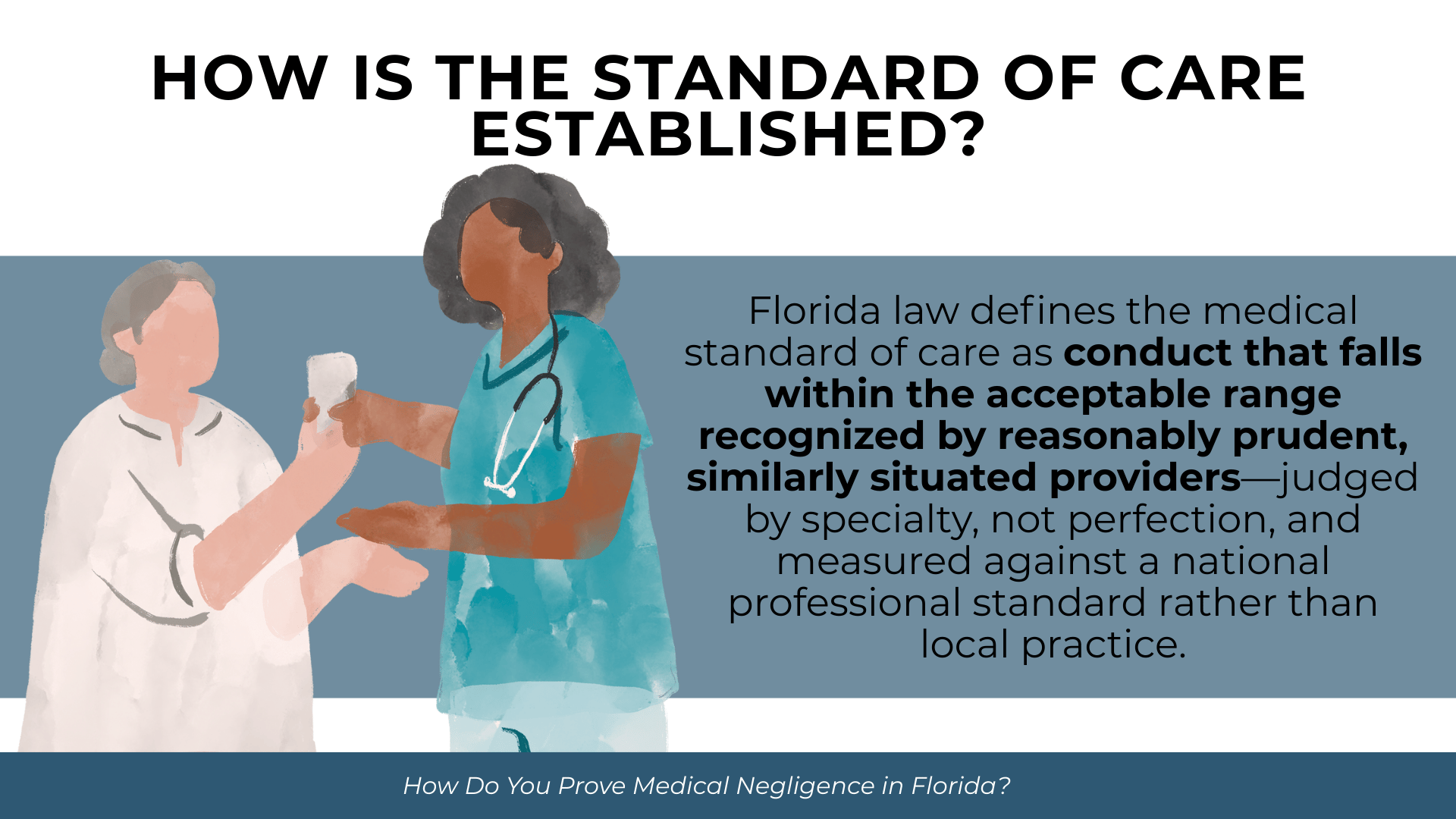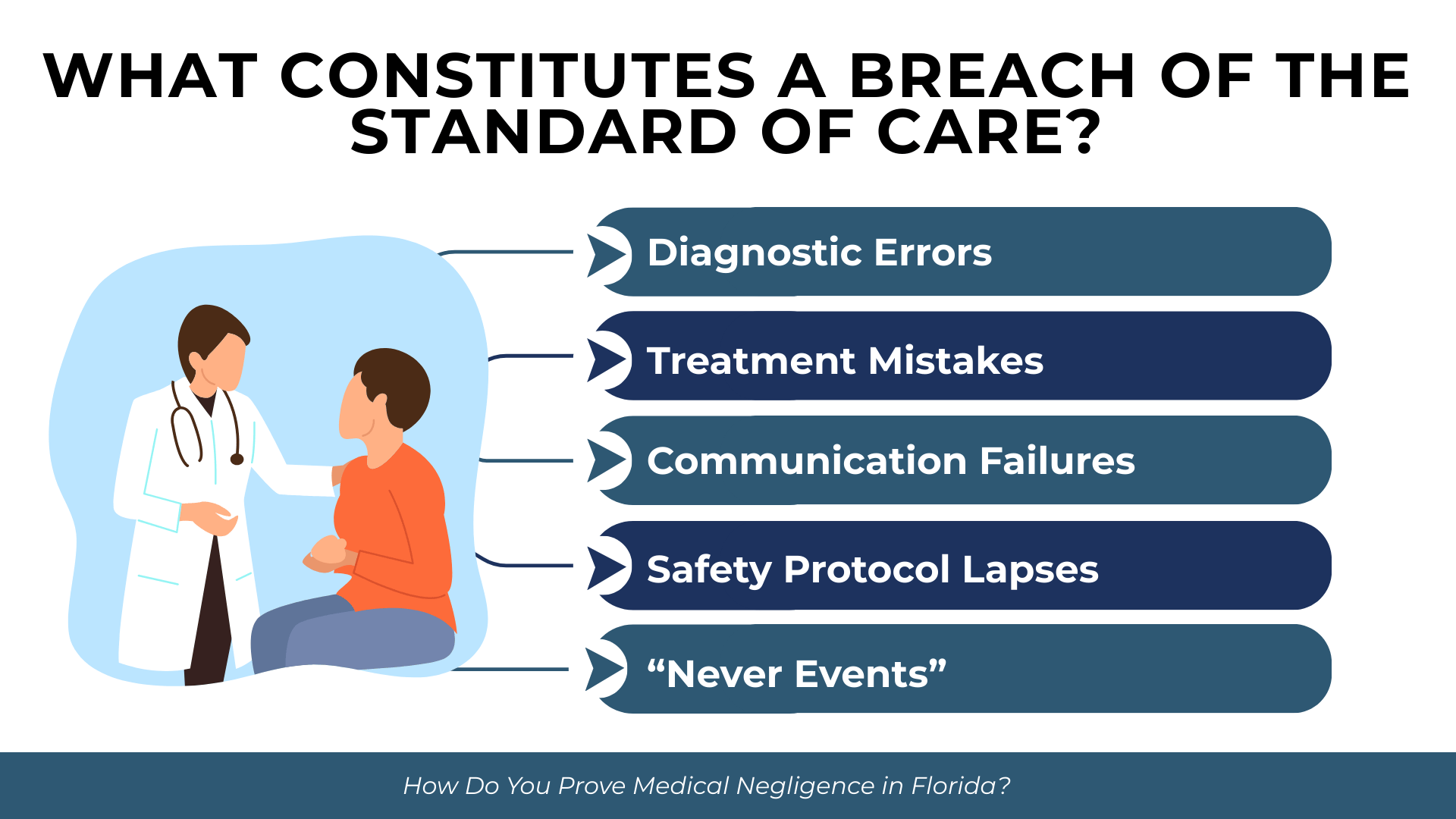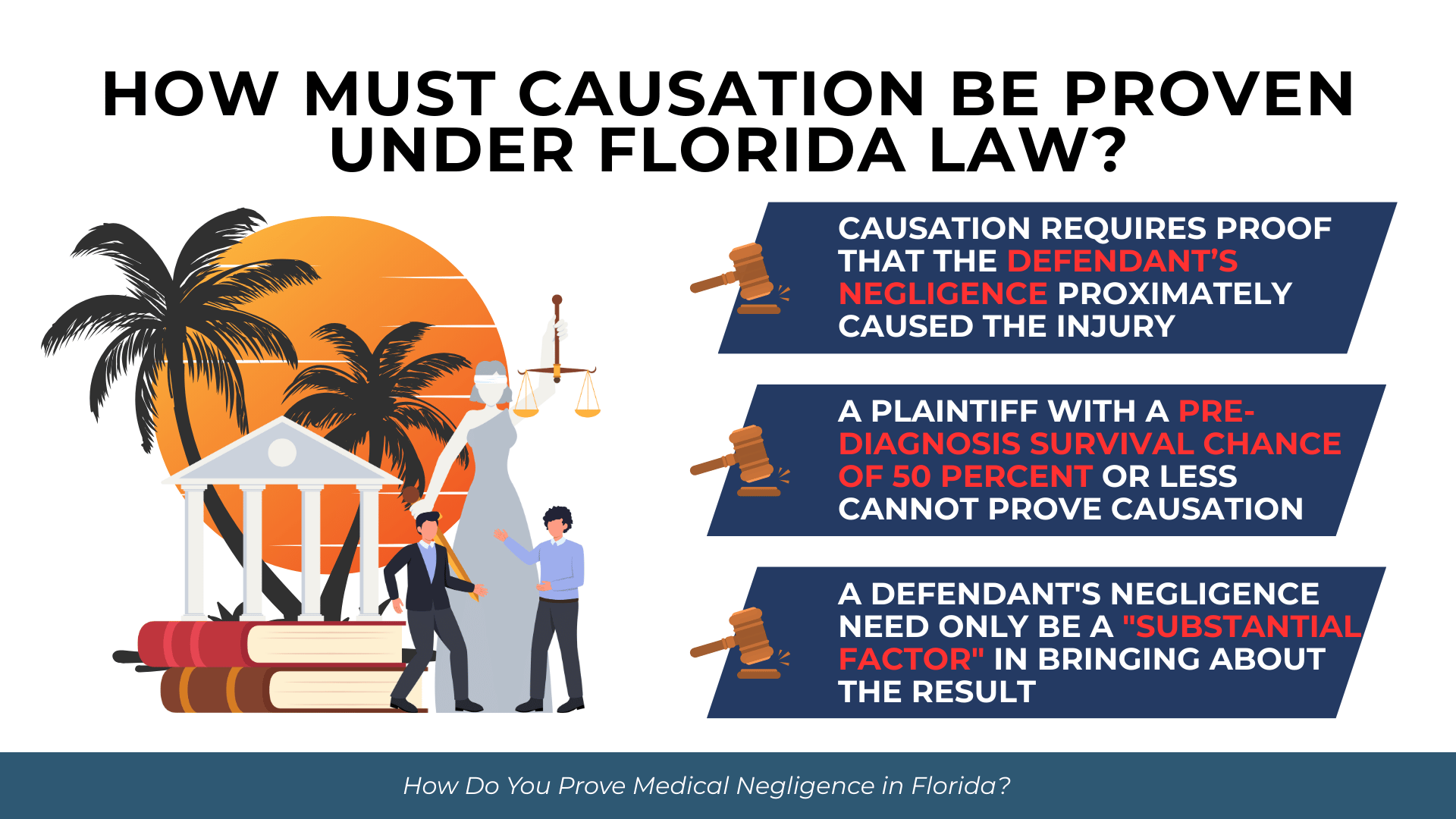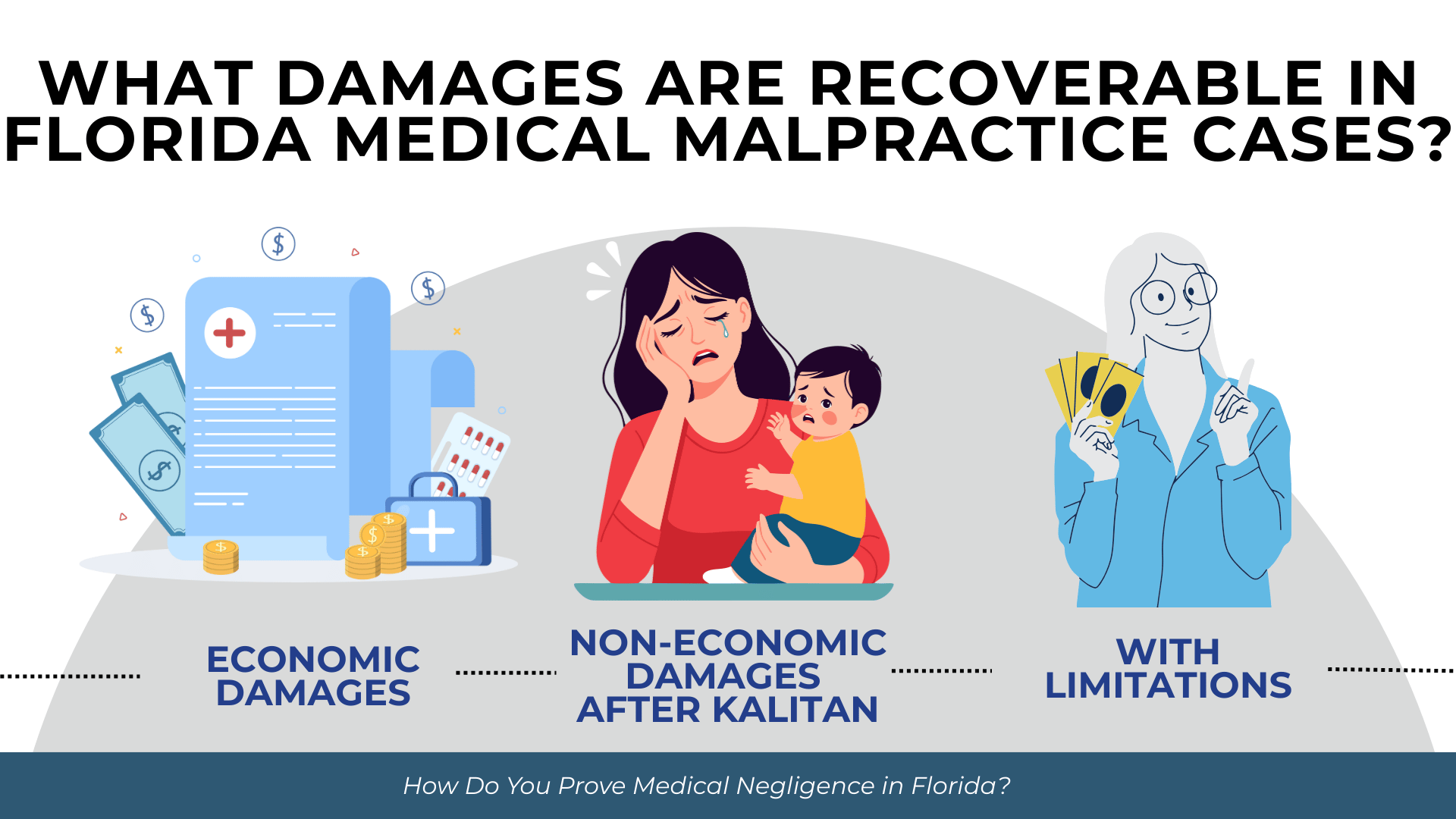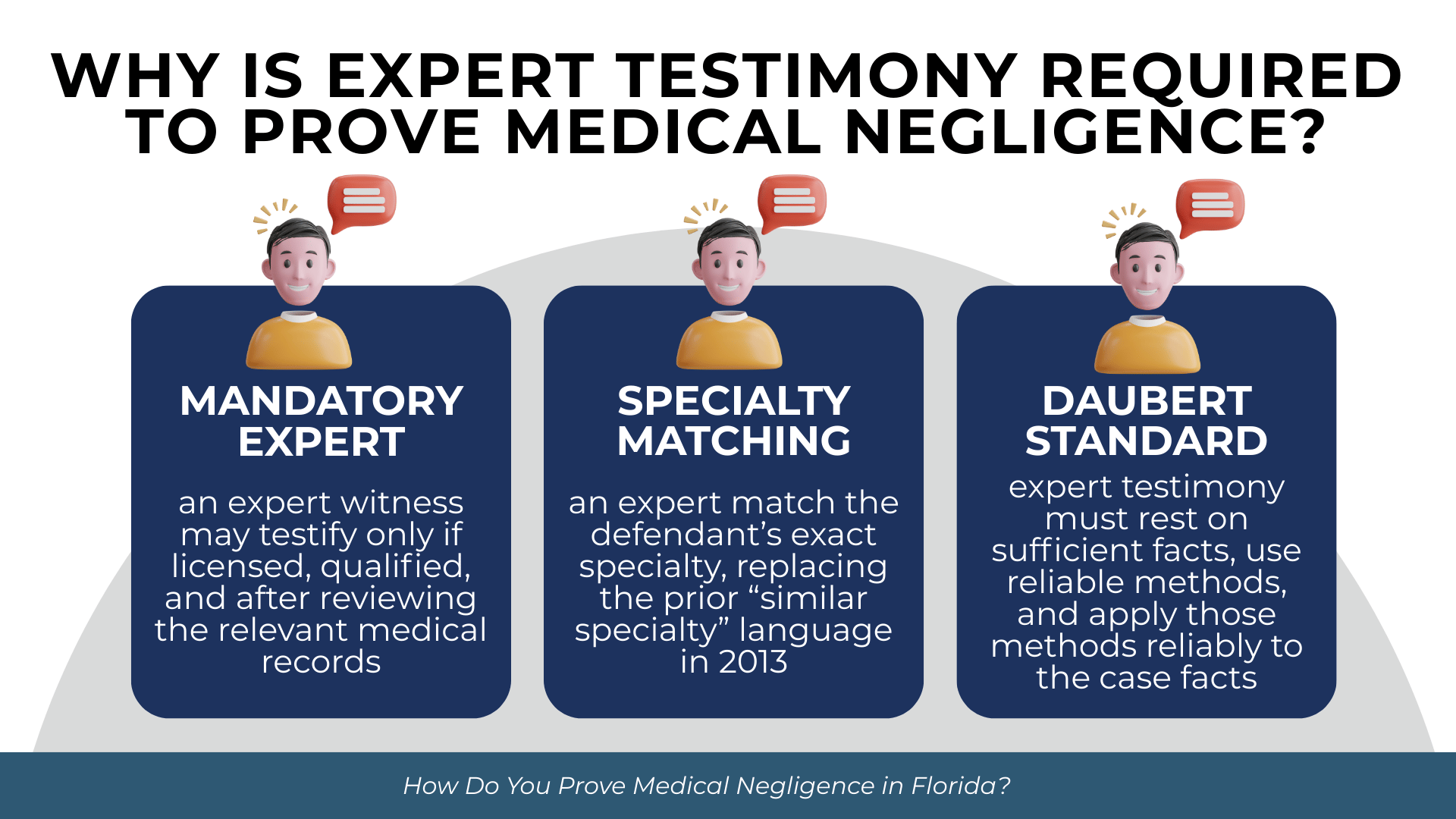Proving medical negligence in Florida requires more than showing that a healthcare provider made a mistake or that treatment resulted in a poor outcome. Florida law establishes specific legal elements that must be satisfied, evidentiary standards that must be met, and procedural requirements that must be followed before a medical malpractice lawsuit can even be filed. Understanding what the law requires is essential for anyone considering whether they have a viable claim.
Florida’s medical malpractice framework is governed primarily by Chapter 766 of the Florida Statutes, which sets forth the standards for establishing liability against healthcare providers. The statute creates a structured process designed to ensure that claims are supported by qualified medical opinion before they proceed to litigation.
What Are the Four Elements of Medical Negligence in Florida?
The Legal Framework Under Florida Statute § 766.102
Florida Statute § 766.102 establishes the foundational requirements for medical malpractice claims. The Florida Supreme Court articulated the essential elements of a medical negligence claim in Wale v. Barnes, 278 So. 2d 601 (Fla. 1973), establishing that plaintiffs must prove each component of their case by the greater weight of the evidence.
A plaintiff pursuing a medical malpractice claim in Florida must establish four distinct elements:
- The applicable standard of care that governed the healthcare provider’s conduct
- A breach of that standard through the provider’s actions or omissions
- A causal connection between the breach and the plaintiff’s injury
- Compensable damages resulting from the injury
Why All Four Elements Must Be Proven
Each element serves as an independent requirement. A plaintiff who establishes three elements but fails on the fourth cannot recover. For example, a surgeon who clearly deviated from accepted practice but whose deviation did not cause the patient’s injury has not committed actionable malpractice. Similarly, a patient who suffered a terrible outcome but cannot demonstrate that the provider’s conduct fell below professional standards has not established a viable claim.
The Burden of Proof Standard
The claimant bears the burden of proving each element by the “greater weight of the evidence,” which means demonstrating that each proposition is more likely true than not true. This standard, sometimes called the preponderance of the evidence, requires the plaintiff to tip the scales at least slightly in their favor on every required element.
How Is the Standard of Care Established?
Call us today at (305) 694-2676 or
contact us online for a free case evaluation.
Hablamos español.


Defining the Prevailing Professional Standard
Florida Statute § 766.102(1) defines the standard of care as “that level of care, skill, and treatment which, in light of all relevant surrounding circumstances, is recognized as acceptable and appropriate by reasonably prudent similar health care providers.” This definition focuses on what the medical profession itself considers proper practice rather than what might seem reasonable to a layperson.
The standard is not one of perfection. Healthcare providers are not expected to achieve optimal outcomes in every case or to never make errors in judgment. The question is whether the provider’s conduct fell within the range of what competent professionals in the same field would consider acceptable under the circumstances.
The Specialist Standard in Florida
Florida holds specialists to a specialist standard when practicing within their specialty. Under § 766.102(5)(a), when the defendant is a specialist, the standard of care is established by reference to what similar specialists would do. A cardiologist treating a heart condition is measured against what other cardiologists would consider appropriate, not against what a general practitioner might do.
When a provider treats a condition outside their specialty, § 766.102(8) provides that a specialist trained in that condition may testify as a “similar health care provider.” This ensures that the standard applied reflects the expertise relevant to the specific treatment at issue.
Florida’s Departure from the Locality Rule
Florida has largely abandoned the traditional “locality rule” that once measured physicians against the practices of their local community. The state now follows a national professional standard for clinical care. Under § 766.102(7), only hospital and facility administrative matters may be evaluated under a modified locality rule. Clinical decision-making is judged against what reasonably prudent providers would do regardless of geographic location.
What Constitutes a Breach of the Standard of Care?
Common Types of Medical Negligence
Breach occurs when a healthcare provider’s conduct falls below the prevailing professional standard of care. Under Florida Statute § 766.102(2), for affirmative medical intervention, breach requires showing that the injury was not within the necessary or reasonably foreseeable results of the procedure when performed according to standard practices.
Medical negligence commonly arises in several recognizable patterns:
- Diagnostic failures, including missed diagnoses, delayed diagnoses, or misdiagnoses that result in harm
- Treatment errors, such as medication mistakes, improper surgical technique, or failure to monitor patient condition
- Communication failures between providers that result in critical information not being conveyed
- System and protocol failures where established safety procedures are not followed
- “Never events” like wrong-site surgery or retained surgical instruments that should not occur under any circumstances
When Res Ipsa Loquitur Applies
In certain circumstances, Florida allows plaintiffs to invoke the doctrine of res ipsa loquitur, meaning “the thing speaks for itself.” The Florida Supreme Court established the application of this doctrine in Marrero v. Goldsmith, 486 So. 2d 530 (Fla. 1986), holding that a res ipsa instruction is appropriate when the patient was unconscious during treatment and the injury occurred to a body part remote from the surgical site.
The Goodyear Tire & Rubber Co. v. Hughes Supply, Inc., 358 So. 2d 1339 (Fla. 1978), decision articulated Florida’s three-factor test for res ipsa loquitur. The doctrine may apply when the type of injury ordinarily requires negligence, the instrumentality causing injury was under the defendant’s exclusive control, and the plaintiff did not contribute to the injury. Res ipsa is a rule of evidence that permits, but does not compel, an inference of negligence.
The Foreign Body Presumption
Florida provides a specific statutory presumption for retained surgical items. Under § 766.102(3)(b), discovery of a foreign body such as a sponge, clamp, forceps, or surgical needle constitutes prima facie evidence of negligence. This shifts the burden to the defendant to rebut the presumption rather than requiring the plaintiff to prove exactly how the object came to be left inside the patient.
How Must Causation Be Proven Under Florida Law?
The “More Likely Than Not” Standard
Causation in Florida medical malpractice requires the plaintiff to establish that the defendant’s negligence was the proximate cause of the injury. The landmark case Gooding v. University Hospital Building, Inc., 445 So. 2d 1015 (Fla. 1984), established that plaintiffs must prove causation under the “more likely than not” standard, meaning greater than 50 percent probability.
This standard requires plaintiffs to demonstrate not merely that negligence might have caused the injury, but that it probably did. Expert testimony must establish that the connection between the breach and the harm exceeds the 50 percent threshold.
Florida’s Rejection of Loss of Chance
Florida explicitly rejected the “loss of chance” doctrine in Gooding. The court answered “in the negative” when asked whether recovery for loss of a chance to survive predicated upon alleged medical malpractice is actionable in Florida. This means a plaintiff whose pre-diagnosis survival probability was 50 percent or less cannot establish causation even if the provider’s negligence clearly reduced that probability further.
For example, if a patient had a 40 percent chance of surviving cancer before a delayed diagnosis and the delay reduced that probability to 10 percent, Florida law does not permit recovery because the patient could never establish that proper diagnosis would “more likely than not” have resulted in survival.
The Substantial Factor Test
While causation must meet the greater-than-50-percent threshold, the defendant’s negligence need not be the sole or even primary cause of injury. In Ruiz v. Tenet Hialeah Healthsystem, Inc., 260 So. 3d 977 (Fla. 2018), the Florida Supreme Court clarified that a defendant’s negligence need only be a “substantial factor” in bringing about the result. A physician cannot insulate themselves from liability by pointing to the subsequent negligence of another treating provider.
What Damages Are Recoverable in Florida Medical Malpractice Cases?
Get started with your complimentary case evaluation today;
call us at (305) 694-2676 or reach us online using our
secure contact form.


Economic Damages
Economic damages compensate for quantifiable financial losses resulting from medical negligence. These damages have no statutory cap and include all measurable monetary harm.
Recoverable economic damages in Florida medical malpractice cases include:
- Past medical expenses for treatment necessitated by the negligence
- Future medical expenses, including ongoing care, rehabilitation, and anticipated procedures
- Lost earnings from time missed from work during recovery
- Lost earning capacity if the injury impairs the plaintiff’s ability to work in the future
- Out-of-pocket expenses related to the injury
- Cost of household services the plaintiff can no longer perform
Non-Economic Damages After Kalitan
Non-economic damages compensate for losses that are real but not easily quantifiable in monetary terms. Following two landmark decisions, Florida currently has no enforceable caps on non-economic damages in medical malpractice cases.
In Estate of McCall v. United States, 134 So. 3d 894 (Fla. 2014), the Florida Supreme Court struck down statutory caps on non-economic damages in medical malpractice wrongful death cases as violating the Equal Protection Clause of the Florida Constitution. The court extended this holding to all medical malpractice cases in North Broward Hospital District v. Kalitan, 219 So. 3d 49 (Fla. 2017).
Non-economic damages may include physical pain and suffering, mental anguish, disfigurement, loss of enjoyment of life, and loss of consortium for spouses.
Limitations That May Apply
Several limitations may affect damage recovery in specific circumstances. The “Free Kill Law” under § 768.21(8) restricts non-economic damages in medical malpractice wrongful death cases when the decedent was an unmarried adult whose only survivors are parents or adult children over 25. Government defendants face sovereign immunity caps of $200,000 per person and $300,000 per incident under § 768.28, though claims bills to the Legislature may seek amounts beyond these caps.
Why Is Expert Testimony Required to Prove Medical Negligence?
Mandatory Expert Requirements Under Florida Law
Expert testimony on standard of care is mandatory in Florida medical malpractice cases. The question of what constitutes acceptable medical practice is not within the common knowledge of jurors and must be established through qualified medical opinion.
Florida Statute § 766.102 and § 766.203 establish the expert requirements. An expert witness may not testify unless the witness holds an active and valid license as a healthcare provider, conducts a complete review of the pertinent medical records, and satisfies specific qualification requirements based on the type of defendant provider.
Specialty-Matching Rules for Experts
Florida imposes strict specialty-matching requirements for expert witnesses. For cases involving specialists, § 766.102(5)(a) requires that the expert specialize in the same specialty as the defendant. The 2013 amendments to the statute eliminated the former “similar specialty” language, requiring an exact match.
Additionally, the expert must have devoted professional time during the three years immediately preceding the incident to active clinical practice, instruction, or clinical research in that same specialty. For general practitioners, the requirement is five years of active involvement in general medicine under § 766.102(5)(b).
The Daubert Standard in Florida
Expert testimony in Florida must satisfy the Daubert standard adopted in In re Amendments to the Florida Evidence Code, 278 So. 3d 551 (Fla. 2019). Under Florida Statute § 90.702, expert testimony must be based on sufficient facts or data, be the product of reliable principles and methods, and reflect reliable application of those principles to the facts of the case.
What Pre-Suit Steps Must Be Completed Before Filing?
The Mandatory Investigation Requirement
Florida law requires claimants to complete a pre-suit investigation before filing a medical malpractice complaint. Under Florida Statute § 766.203, this investigation must ascertain whether there are reasonable grounds to believe the defendant was negligent and that such negligence resulted in injury to the claimant.
The investigation must result in a verified written opinion from a qualified medical expert corroborating that reasonable grounds support the claim. This opinion must be obtained before the notice of intent is mailed and becomes subject to discovery, unlike other pre-suit work product.
Notice of Intent and the 90-Day Period
Before filing suit, claimants must serve written notice of intent to initiate litigation upon each prospective defendant by certified mail at least 90 days before filing. Under § 766.106(2), this notice must include specific information:
- A list of all known healthcare providers who treated the claimant for injuries subsequent to the alleged negligence
- All known providers during the two years before the alleged act
- Copies of all medical records relied upon by the expert in signing the corroborating affidavit
- An executed HIPAA authorization form per § 766.1065
The 90-day pre-suit investigation period tolls the statute of limitations under § 766.106(4). In Hankey v. Yarian, 755 So. 2d 93 (Fla. 2000), the Florida Supreme Court clarified that claimants receive the full benefit of their original statutory time period plus the 90-day pause.
Statute of Limitations Considerations
Medical malpractice actions in Florida must generally be commenced within two years from the time the incident is discovered or should have been discovered with due diligence. However, in no event may an action be commenced later than four years from the date of the incident under the statute of repose established by § 95.11(5)(c).
The discovery rule was refined in Tanner v. Hartog, 618 So. 2d 177 (Fla. 1993), which held that knowledge triggering the limitations period means knowledge of the injury and a “reasonable possibility that the injury was caused by medical malpractice.” An automatic 90-day extension is available upon petition to the clerk with filing fee, but this petition must be filed within the limitations period under § 766.104(2).
Frequently Asked Questions About Proving Medical Negligence in Florida
Can I prove medical negligence without an expert witness?
Expert testimony is required in virtually all Florida medical malpractice cases because the standard of care is not within the common knowledge of jurors. The primary exception involves situations where negligence is so obvious that a layperson can recognize it without medical training, such as when a foreign object is discovered inside a patient after surgery. Even then, the statutory presumption under § 766.102(3)(b) provides evidentiary support rather than eliminating expert requirements entirely.
What happens if my doctor’s negligence reduced my chances of recovery but didn’t cause my injury outright?
Florida does not recognize the “loss of chance” doctrine. Under Gooding v. University Hospital Building, Inc., if you cannot establish that proper treatment would “more likely than not” have resulted in a better outcome, you cannot recover damages. This means if your pre-existing condition already gave you less than a 50 percent chance of recovery, a negligent delay in treatment is not actionable even if it further reduced your chances.
How long do I have to file a medical malpractice lawsuit in Florida?
The standard statute of limitations is two years from discovery of the injury and its potential connection to malpractice. However, the four-year statute of repose creates an absolute deadline measured from the date of the incident. For minors, the four-year repose period does not bar claims filed before the child’s eighth birthday. The 90-day pre-suit notice period tolls these deadlines while it runs.
Does my own failure to follow medical advice affect my case?
Florida applies pure comparative negligence to medical malpractice claims, meaning your own contributory fault reduces your recovery proportionally but does not bar it entirely. Importantly, medical malpractice claims are exempt from the 50 percent bar rule that applies to other negligence claims under HB 837 (2023). However, your non-compliance must be causally connected to the claimed injury to be relevant; failure to follow advice unrelated to your injury would not reduce your recovery.
What if the hospital, not just the doctor, was negligent?
Hospitals may be held liable under several theories. Under respondeat superior, hospitals are liable for the negligence of employed physicians and staff. Under apparent agency principles established in Irving v. Doctors Hospital of Lake Worth, Inc., 415 So. 2d 55 (Fla. 4th DCA 1982), hospitals may be liable for independent contractor physicians if the hospital held them out as agents and patients reasonably relied on that appearance. Hospitals may also face direct corporate liability for failures in credentialing, supervision, or risk management under § 766.110.
Conclusion
Proving medical negligence in Florida requires establishing four distinct elements through qualified expert testimony while satisfying mandatory pre-suit procedural requirements. The standard of care must be defined by reference to what reasonably prudent similar providers would do, breach must be proven by showing conduct that fell below that standard, causation must satisfy the “more likely than not” threshold, and damages must be documented.
The pre-suit investigation and notice requirements reflect Florida’s structured approach to medical malpractice litigation, designed to ensure claims are supported by qualified medical opinion before proceeding to court. Time limitations make early evaluation essential, as the two-year statute of limitations and four-year statute of repose create firm deadlines for pursuing claims.
If you have questions about whether you can prove medical negligence in your situation, contact Prosper Injury Attorneys to discuss your circumstances.



